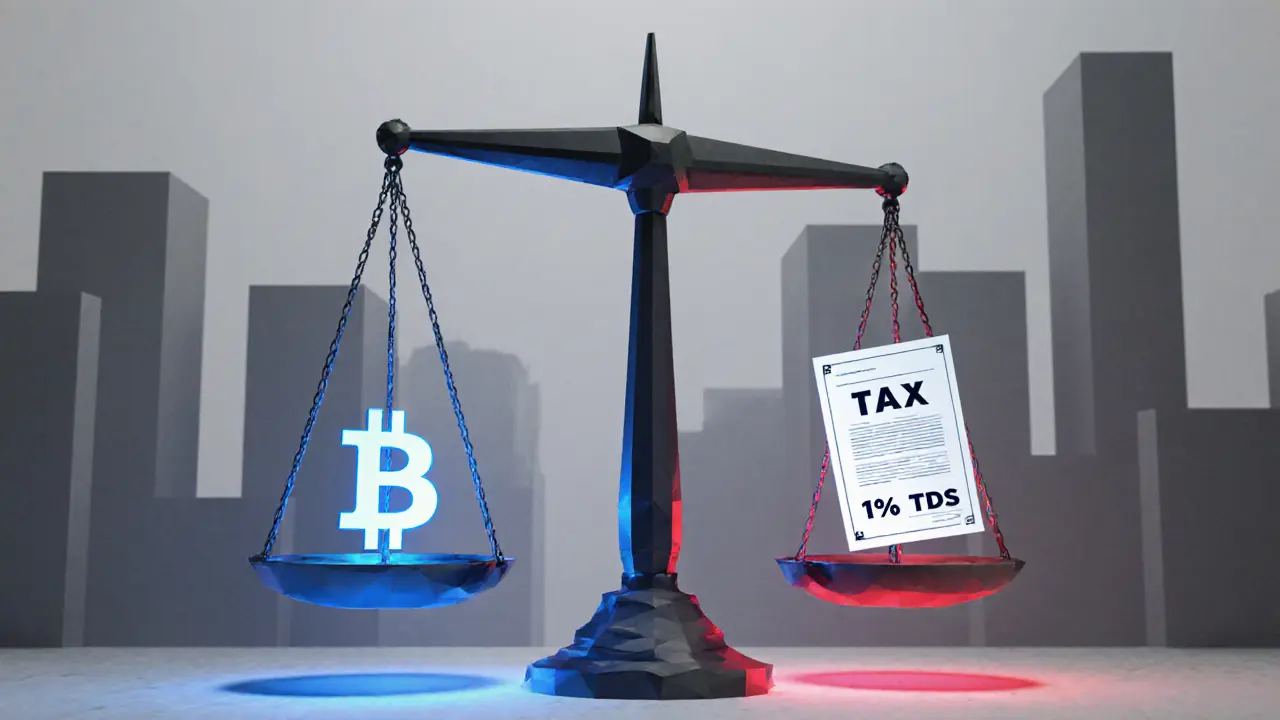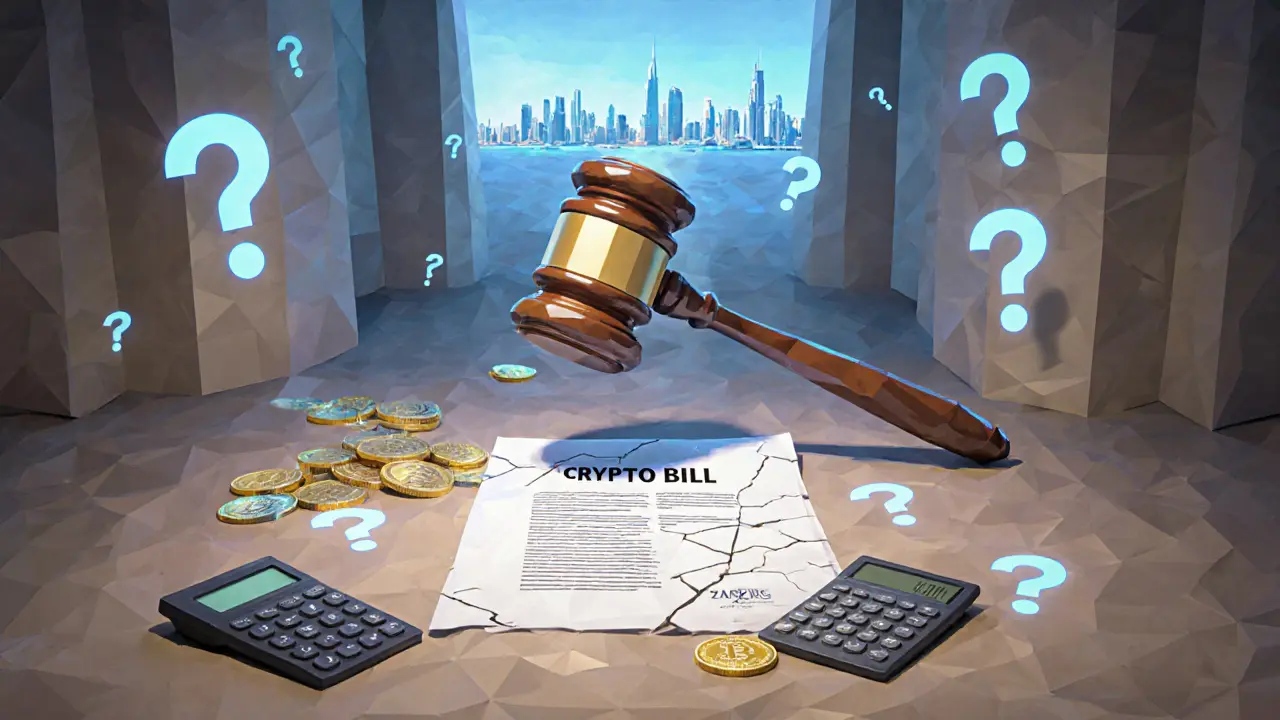Supreme Court Crypto Ruling in India: What It Means for Traders Today

India Crypto Tax Calculator
Calculate Your India Crypto Tax Liability
• 30% tax on all crypto profits
• 1% TDS (Tax Deducted at Source) on every trade above ₹50,000
• FIFO method required for tax calculations
Your Transactions
No transactions added yet
Tax Calculation Results
How to File Your Taxes
- 1 Report all crypto income under "Income from Other Sources" in your ITR
- 2 Use FIFO method (first-in, first-out) to calculate gains
- 3 Maintain detailed records of all transactions with screenshots, transaction IDs, and exchange statements
- 4 Verify your 1% TDS is reflected in Form 26AS
- 5 Consider hiring a crypto-specialized CA for complex cases
On March 4, 2020, the Supreme Court of India did something no one expected: it overturned the Reserve Bank of India’s ban on cryptocurrency. That ruling didn’t legalize crypto like a law would - but it removed the biggest roadblock holding back millions of Indians who wanted to trade, hold, or use digital assets. Today, in 2025, that decision still shapes everything from how you buy Bitcoin to how much tax you pay on your gains.
What the Supreme Court Actually Did
The RBI had issued a circular in April 2018 telling banks and payment providers: Don’t deal with crypto at all. That meant if you ran a crypto exchange like WazirX or CoinDCX, you couldn’t open a bank account. You couldn’t let users deposit rupees. You couldn’t cash out profits. It wasn’t a law banning crypto - it was a financial chokehold. The Supreme Court called it disproportionate and unconstitutional. The court didn’t say crypto is legal tender. It didn’t say it’s safe. It just said the RBI couldn’t shut down an entire industry without evidence that it was causing systemic harm. The ruling was based on the principle that if something isn’t illegal, the government can’t ban it just because it’s new or risky. That’s a big deal in a country where regulators often act first and think later.What Changed After the Ruling
Right after the decision, crypto platforms saw a surge. WazirX reported a 400% jump in new users within three months. CoinDCX added over a million users in under a year. By 2025, India has an estimated 15 to 20 million crypto users - among the highest in the world. Banks finally started reopening accounts. Payment gateways like Razorpay and PayU began integrating with crypto exchanges. People could buy Bitcoin with UPI, pay for services with Ethereum, and even get loans against their crypto holdings. The ecosystem grew fast - not because the government supported it, but because the court removed the fear of being cut off from the banking system.But Here’s the Catch: Taxes Are Brutal
Just because you can trade crypto doesn’t mean it’s easy or cheap. In 2022, the government slapped on two taxes that make India one of the most expensive places in the world to trade digital assets:- 30% tax on all profits - no matter how long you held the asset. Even if you bought Bitcoin for $10,000 and sold it for $11,000, you pay ₹30,000 in tax on ₹10,000 profit.
- 1% TDS (Tax Deducted at Source) - every time you trade, even if you’re breaking even. If you swap Bitcoin for Ethereum, the exchange withholds 1% of the trade value as tax upfront.

What the Government Still Won’t Do
Here’s the biggest problem: the Supreme Court told the government to make rules. Three years later, it still hasn’t. The proposed Cryptocurrency and Regulation of Official Digital Currency Bill, 2021 wanted to ban private crypto and launch a government-backed digital rupee. But that bill never passed. In October 2025, the Supreme Court publicly called out the government for turning a “blind eye.” Justice Surya Kant even said unregulated Bitcoin trading is “nothing but a more polished form of Hawala” - a reference to informal money transfer networks. That’s the paradox: the court protects your right to trade, but the government refuses to give you clear rules. No guidelines on NFTs. No clarity on DeFi. No rules for cross-border transfers. If you use a wallet like MetaMask to interact with a smart contract, you’re in legal gray territory. You’re on your own.How People Are Dealing With It
Most casual users just buy Bitcoin or Ethereum, hold it for a few years, and cash out - hoping they can prove their cost basis to the tax department. They keep records manually, use Excel sheets, or pay for tax software like Koinly or CoinTracker. Serious traders? They hire chartered accountants who specialize in crypto. They file ITR-3 forms and track every single trade - even small swaps. Some even use offshore exchanges to avoid the 1% TDS, though that comes with its own legal risks. Startups aren’t staying. Many Indian crypto founders have moved to Dubai, Singapore, or Portugal, where the rules are clearer and the taxes lower. India still has the users - but it’s losing the builders.
What’s Next?
The Supreme Court isn’t done. In October 2025, it heard a bail petition from a man accused of crypto fraud in Gujarat. The court didn’t just rule on bail - it used the hearing to warn the government again: “You can’t ignore the reality of global finance.” The writing is on the wall. Regulation is coming. But will it be smart? Or will it be punitive? If the government creates a balanced framework - licensing exchanges, protecting consumers, enforcing AML rules, and lowering the tax burden - India could become a crypto hub. But if they keep treating crypto like a criminal enterprise, they’ll just push innovation offshore.What You Need to Do Right Now
If you’re trading crypto in India, here’s what you must do:- Track every transaction - buys, sells, swaps, staking rewards. Even small ones.
- Calculate your gains - use the FIFO method (first in, first out) for tax purposes. The tax department expects it.
- Pay the 30% tax - report all crypto income under “Income from Other Sources” in your ITR.
- Keep proof of purchase - screenshots, transaction IDs, exchange statements. You’ll need them if the IT department asks.
- Don’t ignore TDS - if you traded on an Indian exchange, the 1% was already taken. But make sure it’s reflected in your Form 26AS.
Final Thought
The Supreme Court gave India’s crypto community a lifeline. But the government hasn’t handed them a map. Right now, you’re allowed to swim - but you’re not told where the shore is, or if there are sharks nearby. Stay informed. Stay cautious. And don’t wait for the government to protect you. In India’s crypto world, the only rule that matters is this: know your risks, keep your records, and pay your taxes.Is cryptocurrency legal in India after the Supreme Court ruling?
Yes, cryptocurrency is legal to hold and trade in India. The Supreme Court struck down the RBI’s 2018 ban on banks serving crypto businesses. That means you can buy, sell, and hold Bitcoin, Ethereum, and other digital assets without breaking the law. But there’s no formal legal framework - so you’re operating in a gray zone with heavy taxes and no consumer protections.
Do I have to pay tax on crypto profits in India?
Yes. India taxes all crypto profits at a flat 30%, regardless of how long you held the asset. You also pay 1% TDS (Tax Deducted at Source) on every trade above ₹50,000 (or ₹10,000 in a single day). Losses cannot be offset against other income. Even swapping one crypto for another triggers a taxable event.
Can I use Indian banks to trade crypto?
Yes. After the Supreme Court’s 2020 ruling, banks are allowed to serve crypto exchanges. Most major Indian exchanges like CoinDCX, ZebPay, and Bitbns now have working bank accounts. You can deposit rupees via UPI, NEFT, or IMPS. However, some banks still hesitate - so if your account gets frozen, it’s often due to internal policy, not law.
Are NFTs and DeFi regulated in India?
No. There are no official rules for NFTs, DeFi protocols, or crypto lending platforms. The Supreme Court has acknowledged these are part of the evolving digital economy, but the government has not issued any guidance. That means you’re on your own legally. Any income from NFT sales or DeFi yields is still subject to the 30% tax, but how to report it isn’t clear.
Why hasn’t the government passed a crypto law yet?
The government has been divided. Some officials want to ban crypto to protect the rupee and prevent money laundering. Others recognize its potential for innovation and financial inclusion. The proposed 2021 bill aimed to ban private crypto and launch a digital rupee, but it stalled in Parliament. With no political consensus and pressure from the Supreme Court, the issue remains in limbo.
Should I invest in crypto in India right now?
It depends on your risk tolerance. The legal right to trade exists, and the market is growing. But the tax burden is among the highest globally, and regulatory uncertainty is high. If you’re comfortable with volatility, understand the tax rules, and are willing to keep detailed records, crypto can be part of a diversified portfolio. But don’t expect legal protection or refunds if something goes wrong.

Louise Watson
November 7, 2025 AT 13:27So the court said yes, but the government says maybe. And we pay 30% just to exist in this gray zone.
andrew seeby
November 9, 2025 AT 05:30bro i bought btc in 2021 and still holding... taxes are wild but at least i can trade 😅
Allison Doumith
November 10, 2025 AT 15:09They removed the ban because they had no legal basis to enforce it not because they believe in crypto. The government still sees it as a threat to control and they’re not wrong to be scared. But fear doesn’t make policy it makes panic
Emily Unter King
November 11, 2025 AT 04:57From a compliance standpoint the 1% TDS is actually a net positive. It automates reporting and reduces audit risk. The real issue is the lack of guidance on DeFi and NFTs. Without clear classification these are treated as speculative instruments when they’re infrastructure. That’s a regulatory failure not a market failure.
John Doe
November 12, 2025 AT 02:50They’re not ignoring crypto they’re waiting for the next crash. When everyone loses money they’ll say ‘told you so’ and ban it anyway. This is all a trap. The 30% tax is designed to drain retail. Banks are still spying on your transactions. They want you to think you’re free while they’re counting every satoshi.
Benjamin Jackson
November 13, 2025 AT 21:04I’ve been trading since 2019 and I’ve seen this dance before. The court gave us breathing room. Now it’s up to us to build something better than what we had. Not everyone needs to be a trader. Some of us just want to hold and learn. That’s okay too.
Tara R
November 14, 2025 AT 18:56Let’s be honest no one in India actually pays the 30% tax. They just pretend they did. The entire system is a farce built on performative regulation. The government doesn’t want crypto to succeed they just don’t want to look like they’re losing control.
Rob Ashton
November 16, 2025 AT 15:51For those considering participation in this space: I strongly recommend engaging with a qualified tax professional who has direct experience with digital asset reporting under Indian law. The consequences of noncompliance are severe and irreversible. Documentation is not optional-it is the foundation of your legal and financial integrity in this unregulated environment.
Finn McGinty
November 17, 2025 AT 20:01Let me tell you something about the Indian government. They don’t hate crypto. They hate being out of control. The Supreme Court gave the people power. The government can’t arrest every trader. So they tax them into submission. They don’t want to ban it-they want to bleed it dry. And guess what? It’s working. People are quitting. The ones who stay? They’re either rich or crazy. And honestly? I’m both.
Michelle Sedita
November 19, 2025 AT 05:28I think the real question isn’t whether crypto is legal-it’s whether we’re ready to be a society that trusts individuals with their own money. The court said yes. The government says no. But the people? We’re already living in the future they’re afraid of.
Ryan Inouye
November 20, 2025 AT 01:44India is the only country that taxes you for swapping Bitcoin for Ethereum. In America you can do that tax free. In Germany you hold for a year and it’s gone. Here? You pay 30% and 1% just to move your own money. This isn’t regulation. This is punishment disguised as policy. And the worst part? They think we’re dumb enough to keep playing.